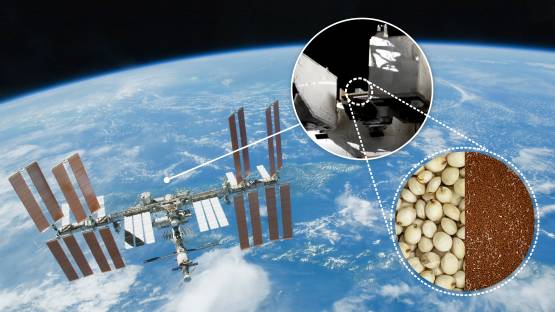Seeds launched into space in November last year, have now been positioned inside and outside the International Space Station to be exposed to the full range of cosmic radiation and the extreme temperatures of space.
This astrobotany investigation, an undertaking of the IAEA and the Food and Agriculture Organization of the United Nations (FAO) through their Joint FAO/IAEA Centre of Nuclear Techniques in Food and Agriculture, aims to explore the effects of cosmic radiation on seeds as part of ongoing research into strengthening crop varieties to withstand the effects of climate change and increase global food security. The aim is to determine whether the harsh conditions of space, such as extremes of temperature and cosmic radiation, will lead to evolutionary changes in the seeds, and in turn, whether those changes could help plants become more resilient in the face of increasingly difficult growing conditions on Earth.
“We have a responsibility to explore nuclear techniques that could make a positive difference to human health and food supplies,” said Najat Mokhtar, IAEA Deputy Director General and Head of the Department of Nuclear Sciences and Applications. “As the world grapples with adapting to consequences of climate change, we need to speed up with plant breeding research to find adequate and cost effective solutions.”
Arabidopsis and sorghum seeds were launched into space from NASA’s Wallops Flight Facility in Virginia, USA, on 7 November 2022 as part of the cargo load of the CRS2 NG-18 mission to the ISS. On 13 December, half the seeds were moved to the ISS Nanoracks external platform. The other half have been kept inside the ISS for comparison, exposed mainly to microgravity and to some levels of radiation.
“Innovative research and development is urgently needed by the smallholder food producers most vulnerable to climate change,” said FAO Deputy Director-General Maria Helena Semedo. “The increasingly harsh growing conditions threaten food production, a situation we hope space science will contribute to change by promoting the development of resilient, nutritious crop varieties in abundance.”
As the world grapples with adapting to consequences of climate change, we need to speed up with plant breeding research to find adequate and cost effective solutions.






